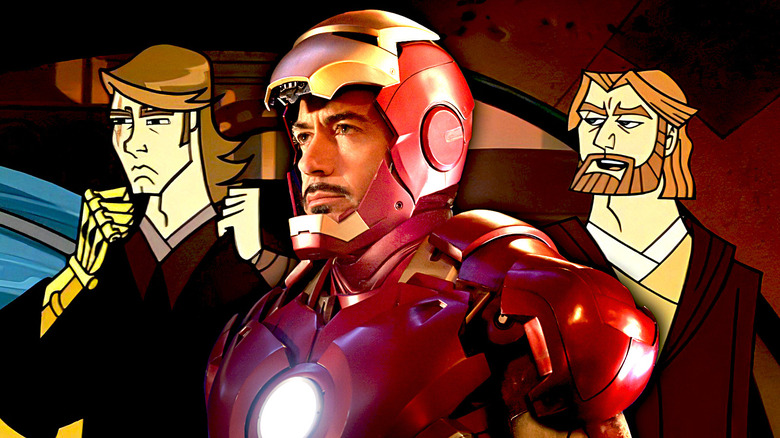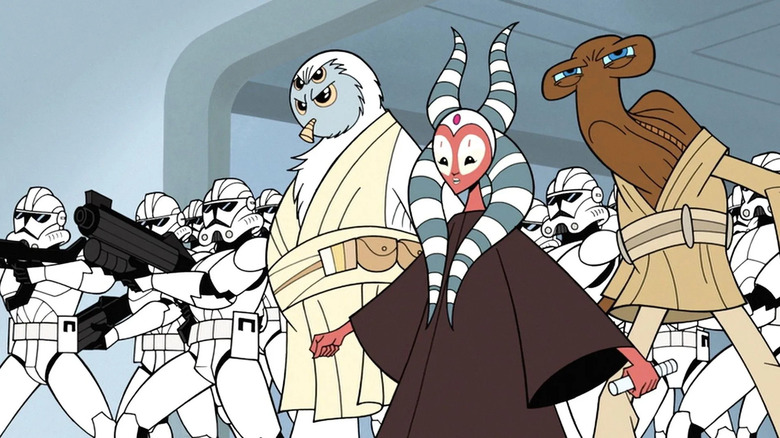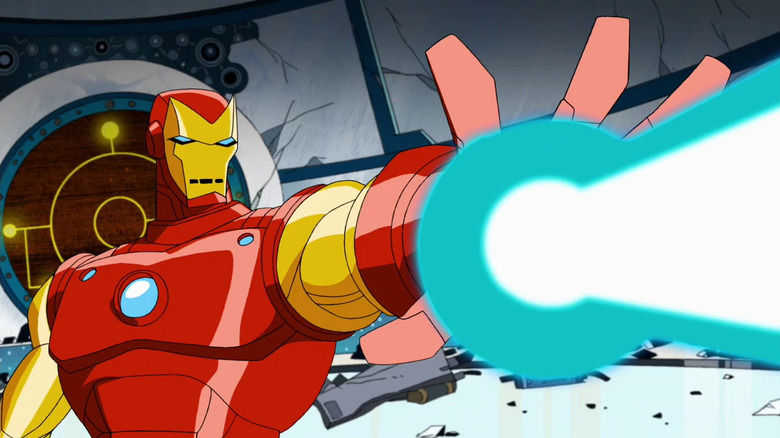Marvel Turned Down A Series Inspired By One Of The Best Star Wars Projects Ever
The best way to adapt comic books to cinema is through animation. At least that's my personal opinion. It's much smoother to put characters from one hand-drawn medium to another than it is trying to weld reality into a setting that was never meant to resemble it. Japanese cartoonists understand this, hence the overflowing manga to anime adaptation pipeline.
But here in America, the biggest superhero movies are the live-action ones that rarely reach the style of the comics they pull from. The Marvel Cinematic Universe hasn't had the greatest success at becoming a multimedia project (their Disney+ shows look ever more like a failed experiment), and a story from the studio's early days shows they missed an early shot.
Genndy Tartakovsky, the acclaimed creator of "Dexter's Laboratory" and "Samurai Jack," did storyboarding work on "Iron Man 2." But he didn't get the job by applying directly for it. No, as Tartakovsky recounted in a recent interview with Collider, he pitched Marvel Studios President Kevin Feige an animated series about Marvel superheroes around 2008 or 2009. "I can take your characters and do what I did with ['Star Wars: Clone Wars']," said Tartakovsky. The revered animation creator refers to his 2003 "Clone Wars" mini-series, set between "Attack of the Clones" and "Revenge of the Sith." Marvel said no, but "Iron Man" director Jon Favreau, a Tartakovsky fan, brought him into the fold for the blockbuster sequel.
The 2003 Star Wars: Clone Wars eclipses later Star Wars animation
George Lucas, a savvy businessman, knew the value of tie-in media, so "Star Wars" embraced being a multimedia franchise. While Tartakovsky's "Clone Wars" is no longer "Star Wars" canon, it actually fits into the films' timeline much better than the 2008 "Clone Wars" series that displaced it does.
Structured as a series of vignette shorts, "Clone Wars" shows the Jedi fighting across the galaxy in action scenes that leave the films in the dust. As it went, "Clone Wars" directly built to "Revenge of the Sith" – debuting General Grievous, showing Anakin Skywalker's knighting as a Jedi, and further teeing up his fall to the dark side.
The action in "Clone Wars" is superheroic. For example, Mace Windu defeats a droid army single-handedly, punching harder than Iron Fist and running as fast as Quicksilver, and it's one of the best animated moments in "Star Wars" history. See Marvel's heroes rendered in that sharp, kinetic style? It sounds heavenly.
The closest thing to a Tartakovsky superhero show is his short-lived "Sym-Bionic Titan," a homage to Japanese mecha anime and tokusatsu. That series followed two alien teenagers and a robot who, after their home planet is invaded, come to Earth for refuge. They disguise themselves as high schoolers, and they have the ability to summon mecha suits that, in turn, combine into the titular Titan. They often need call upon these suits, because the evil General Modula is sending giant kaiju, one after another, to hunt them. Called the "Mutraddi," these monsters look halfway between "Evangelion" Angels and fiends cooked up by Rita Repulsa ("Make my monster grow!").
The balance of high school drama and superheroics, plus the Titan's secret identities? It all feels quite Marvel-ish. Given his obvious love for mecha anime, could Tartakovsky have approached Iron Man in that way? We still don't know.
Marvel has too often ignored animation
Marvel Studios passing on a Tartakovsky-led cartoon when he was barking up their tree? It's not just creative malpractice, it's a pattern of one; Marvel has consistently let DC beat them at animation.
No serialized Marvel cartoon is as good as "Batman: The Animated Series" or "Justice League Unlimited." "Spectacular Spider-Man" came close, but it was canceled before it could realize its full potential. In a 2000 interview, Bruce Timm, architect of most DC animation in the past few decades, had few kind words about the cheaply-made, highly censored Marvel cartoons that aired alongside "Batman," calling the success of his own series akin to being "a one-eyed man in the kingdom of the blind." JHarsh, but not wrong.
Timm's "DC Animated Universe" wrapped up in 2006 with "Justice League Unlimited," but Warner Bros. animation kept going. Since the late 2000s, they've generally put out at least one animated DC film a year, often adapting specific comic arcs. These movies are not always great, but they're good introductions to the characters and stories for young viewers. They certainly helped on-ramp me as a DC fan.
Marvel briefly tried their hand at this, producing eight animated pictures with Lionsgate from 2006 to 2011, but after the contract ended, there were no more. I think that was a mistake. Just imagine recruiting Tartakovsky to direct those.
Favreau's "Iron Man" films did receive an animated tie-in: "Iron Man: Armored Adventures," which was... pretty good. The CGI and art style could be uncanny, but it also gave Iron Man's villains some much-needed depth. Then the 2010 to 2012 "Avengers: Earth's Mightiest Heroes" was the closest Marvel has come to its own "Justice League Unlimited." Sadly, it was pulled after two seasons for the cheaper (and more directly MCU-influenced) "Avengers Assemble."
There are some recent signs of hope for Marvel Animation though (and I don't mean "What If...?"). The "Spider-Verse" films at Sony Pictures Animation feel downright groundbreaking next to most cookie cutter superhero flicks. One of Marvel Studios' most acclaimed projects is "X-Men '97," a revival of the 1990s "X-Men" cartoon that eclipses the original. If Marvel has finally realized the potential animation holds, they should give Tartakovsky a call.


